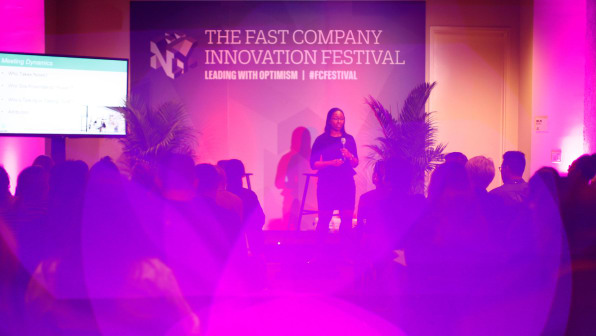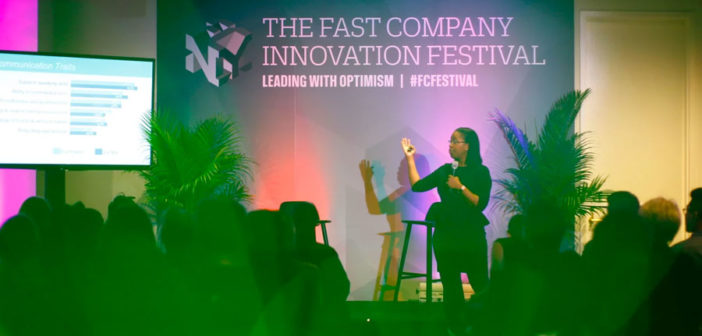Landit CEO Lisa Skeete Tatum says it’s time to ditch mentors and build “personal boards of advisers” instead. Here’s how.
You already have a personal brand, whether you like it or not. According to Lisa Skeete Tatum, CEO and cofounder of Landit, a personalized career platform for women, the way you’re seen and spoken about by your coworkers and peers inevitably adds up to a brand profile, so you might as well shape it intentionally.
It all comes down to, “What is it that people say and think about you that makes them want you in the room?” Skeete Tatum says. Whatever your ideal answer is, that should form the basis of your authentic personal brand, which Skeete Tatum estimates accounts for around 30% of career success.
“Because I am an engineer, I love little hacks,” she told participants at a Fast Company Innovation Festival workshop in New York earlier this week. Here are a few of her top tips.
1. KEEP TRACK OF YOUR WEEKLY ACCOMPLISHMENTS
“Most people don’t, and it is the most impactful thing you can do,” says Skeete Tatum. That might mean setting a calendar reminder for Friday afternoon, for instance, then taking 10 minutes to assemble a quick inventory of your achievements. Whatever it takes to make it a weekly habit, Skeete Tatum says, just do it. Keep a running document that you can add to week after week, so you’ve got a comprehensive record of your contributions that you can draw on later when asking for a raise or promotion, or even just to boost your own confidence.

2. “DRESS LIKE A BADASS”
That’s Skeete Tatum’s advice for outward presentation. But she notes that it’s not about investing in a lavish wardrobe. It’s simply about dressing cleanly, sleekly, and, yes, comfortably.
“You don’t want to be fidgeting” with your clothes in a team meeting where you’re aiming to influence a key decision, or trying to forget how much your shoes hurt while chatting with people at a networking event. Rather than calculating exactly what “business casual” means in your organization, Skeete Tatum offers the classic advice of dressing for the job you want–all the time. “Don’t go to Whole Foods looking crazy because you never know who you’re going to run into there,” she says.
3. CUT WISHY-WASHY WORDS FROM YOUR VOCABULARY
The language you use around the office and while networking can either boost or undercut your credibility, often in subtle ways. But rather than adopting pretentious or “authoritative” language, Skeete Tatum recommends pruning out common phrases that convey uncertainty or lack of confidence. Here are a few of her top offenders:
- “Actually”
- “Just”
- “Can I take a minute to . . .”
- “Sorry to interrupt
- “I may be new, but . . .”
- “I think”
That last one, she points out, is among the most common and pernicious. Just dive in with what you think. As soon as you couch an idea as merely a “thought” you had, you invite people to take it less seriously.

4. DITCH MENTORSHIP AND BUILD A BOARD OF ADVISERS
“I have never in my life met a mentorship program that works,” Skeete Tatum says. It’s too much heavy-lifting to ask of one or two people, she believes. Instead, Skeete Tatum suggests sharing out the function of a traditional mentor among a “personal board of advisers.”
What’s more, she says, you need to think beyond mentorship itself. Taken together, your personal board of advisers should do more than just offer advice–they should “sponsor” and advocate for you. “These are people who help stack the deck in your favor,” not your “5,000 LinkedIn connections,” Skeete Tatum explains. And they “have higher expectations of you than you have of yourself,” since most of us experience some form of impostor syndrome at some point in our careers.
With that in mind, these are five types of people (including a mentor) who should be on your personal board of advisers:
- Mentor. Someone you may touch base with monthly, or every other month, to discuss career- and life-related stuff.
- Sponsor. Skeete Tatum estimates, based on Landit’s research, that having a sponsor “can increase pay by 22% to 30%,” and women and people of color tend to be “over-mentored and under-sponsored,” she adds. Unlike a mentor, a sponsor is “someone who talks about you–you’re not driving it,” Skeete Tatum explains. “They’re opening up the opportunities that you want. Maybe they see things in you that you don’t even know.” Rather than just offering sound counsel, they serve actively as the “amplifier of you and your brand.”
- Connector. “Who is it that you know who can connect you with everyone? Who has deep domain expertise in an area you need that you don’t have in your lifetime to attain?” You may only talk to your connector once or twice each year, Skeete Tatum says, but when you need a crucial introduction, they’re your point of contact.
- Close friend. “Everyone needs that person who you can go to and ugly-cry in front of,” Skeete Tatum explains. Not only are friends underappreciated sources of career support, but, she adds, “You are the average of the five people you spend the most time with.”
- Coach. “Your personal strategist,” according to Skeete Tatum, is someone who can help you plan and develop over the mid- to long-term.
Keeping at least one person in each of these five seats at all times, Skeete Tatum says, distributes the burden you might otherwise saddle one person with. But it’s fine to opt for a rotating cast, she says; the “connector” who’s helping you right now might not be the same person playing that role five years on
Finally, Skeete Tatum, says, “you can rebrand yourself.” If your reputation is damaged for one reason or another, or when you’re trying to pull off a career change, a personal board of advisers can help you put together a rebranding campaign. It may be your career, but you don’t have to build–or rebuild–it alone.
–
This article first appeared in www.fastcompany.com
Seeking to build and grow your brand using the force of consumer insight, strategic foresight, creative disruption and technology prowess? Talk to us at +9714 3867728 or mail: info@groupisd.com or visit www.groupisd.com


